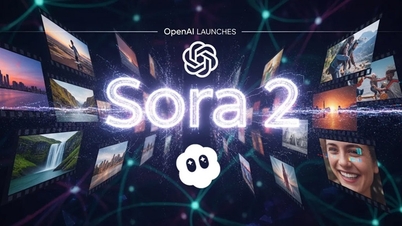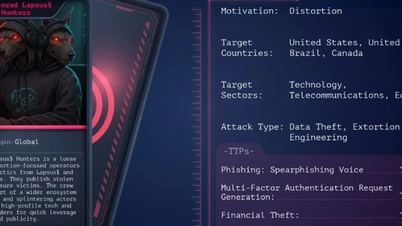
Users manage cryptocurrencies through decentralized financial services (DeFi).
For decades, personal finance management has been associated with banks, savings accounts, credit cards, or familiar investment channels. However, in recent years, a new wave of technology called decentralized finance (DeFi - Decentralized Finance) has emerged.
More than just a tool, DeFi is gradually reshaping the way people keep money, spend it, and invest it, ushering in a completely different financial order than what we are used to.
DeFi - 24/7 open finance
Unlike the traditional financial system, DeFi operates on a decentralized network, allowing users to directly interact with financial protocols without the need for a third party.
With just one e-wallet, they can perform many activities such as depositing savings through lending protocols to automatically generate interest, mortgaging digital assets to borrow capital immediately without documents or appraisal, or transferring money across countries in just a few seconds at low cost thanks to blockchain eliminating intermediary banks.
In addition, DeFi also opens up completely new investment channels such as staking, yield farming or providing liquidity on DEXs (decentralized exchanges), which were previously unavailable in the traditional financial system.
The main attraction is control: instead of trusting the bank, the user holds the keys to their wallet. Every decision to deposit, withdraw or invest is made by the individual, without asking permission or waiting.
Smart contract technology not only automates processes like calculating interest, repaying debt, or reinvesting on a pre-determined schedule, but also personalizes the financial management experience. It is the combination of saving, borrowing, paying, and investing in a transparent, cross-border ecosystem that makes DeFi a completely new way to manage money.
For example: You deposit 100 USDT to lend at 5% interest per year. The smart contract will hold the asset, automatically add interest and return it on time, without the need for bank staff to review the application or sign documents.
Autonomy comes with responsibility
The freedom that DeFi brings also means that users have to shoulder all the risks. Without the "safety cushion" from banks, once the private key is lost, the assets are gone forever. Hacks, scams and projects that collapse overnight still happen continuously, leaving behind many expensive lessons.
In addition, the wild fluctuations of the market make the value of assets can skyrocket but also easily plummet. In an imperfect legal environment, users' rights become even more fragile.
The future of personal finance management
Experts say DeFi is unlikely to completely replace banks, but it is likely to become an important piece in a hybrid financial ecosystem between CeFi (centralized) and DeFi (decentralized). This model takes advantage of the stability of the traditional system while exploiting the transparency and flexibility that blockchain brings.
In Vietnam, DeFi is gradually gaining traction among the young community interested in blockchain and digital assets. The National Assembly's first recognition of digital assets in the Digital Technology Industry Law is considered a big step forward, opening up opportunities for blockchain projects to operate domestically instead of having to "take refuge" abroad.
However, for the market to develop sustainably, Vietnam still needs a more detailed legal framework and digital financial literacy programs to help users understand both opportunities and risks before participating in DeFi.
DeFi is therefore not simply a "new financial technology", but can become a driving force for the formation of modern money management habits: more proactive, more flexible and linked to globalization. Those who know how to take advantage of it properly will get closer to financial freedom, instead of falling into risk.
Source: https://tuoitre.vn/quan-ly-tien-khong-can-ngan-hang-defi-dang-thay-doi-trat-tu-tai-chinh-ra-sao-20250925153445985.htm


![[Photo] Solemn opening of the 8th Congress of the Central Public Security Party Committee, term 2025-2030](https://vphoto.vietnam.vn/thumb/1200x675/vietnam/resource/IMAGE/2025/10/4/f3b00fb779f44979809441a4dac5c7df)
![[Photo] General Secretary To Lam attends the 8th Congress of the Central Public Security Party Committee](https://vphoto.vietnam.vn/thumb/1200x675/vietnam/resource/IMAGE/2025/10/4/79fadf490f674dc483794f2d955f6045)



![[Photo] Bustling Mid-Autumn Festival at the Museum of Ethnology](https://vphoto.vietnam.vn/thumb/1200x675/vietnam/resource/IMAGE/2025/10/4/da8d5927734d4ca58e3eced14bc435a3)























































![[VIDEO] Summary of Petrovietnam's 50th Anniversary Ceremony](https://vphoto.vietnam.vn/thumb/402x226/vietnam/resource/IMAGE/2025/10/4/abe133bdb8114793a16d4fe3e5bd0f12)
![[VIDEO] GENERAL SECRETARY TO LAM AWARDS PETROVIETNAM 8 GOLDEN WORDS: "PIONEER - EXCELLENT - SUSTAINABLE - GLOBAL"](https://vphoto.vietnam.vn/thumb/402x226/vietnam/resource/IMAGE/2025/7/23/c2fdb48863e846cfa9fb8e6ea9cf44e7)































Comment (0)